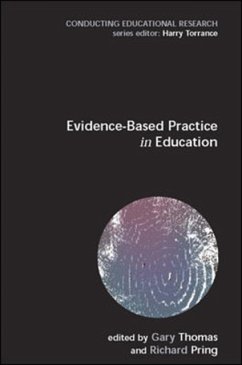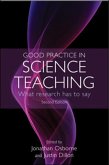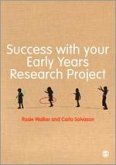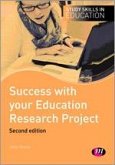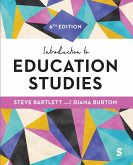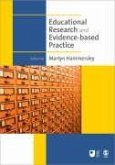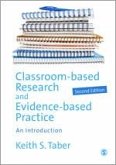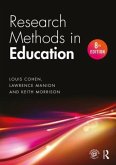Richard Pring, Gary Thomas
Evidence-Based Practice in Education
Herausgegeben von Thomas, Gary; Pring, Richard
41,99 €
inkl. MwSt.
Versandkostenfrei*
Liefertermin unbestimmt
Melden Sie sich
hier
hier
für den Produktalarm an, um über die Verfügbarkeit des Produkts informiert zu werden.

21 °P sammeln
Richard Pring, Gary Thomas
Evidence-Based Practice in Education
Herausgegeben von Thomas, Gary; Pring, Richard
- Broschiertes Buch
Addresses questions such as: What is evidence based practice? How does it operate? What are the arguments against it?
Andere Kunden interessierten sich auch für
![Good Practice in Science Teaching: What Research Has to Say Good Practice in Science Teaching: What Research Has to Say]() Jonathan OsborneGood Practice in Science Teaching: What Research Has to Say41,99 €
Jonathan OsborneGood Practice in Science Teaching: What Research Has to Say41,99 €![Success with your Early Years Research Project Success with your Early Years Research Project]() Rosie WalkerSuccess with your Early Years Research Project114,99 €
Rosie WalkerSuccess with your Early Years Research Project114,99 €![Success with Your Education Research Project Success with Your Education Research Project]() John SharpSuccess with Your Education Research Project46,99 €
John SharpSuccess with Your Education Research Project46,99 €![Introduction to Education Studies Introduction to Education Studies]() Steve BartlettIntroduction to Education Studies44,99 €
Steve BartlettIntroduction to Education Studies44,99 €![Educational Research and Evidence-Based Practice Educational Research and Evidence-Based Practice]() Martyn Hammersley (ed.)Educational Research and Evidence-Based Practice70,99 €
Martyn Hammersley (ed.)Educational Research and Evidence-Based Practice70,99 €![Classroom-based Research and Evidence-based Practice Classroom-based Research and Evidence-based Practice]() Keith TaberClassroom-based Research and Evidence-based Practice49,99 €
Keith TaberClassroom-based Research and Evidence-based Practice49,99 €![Research Methods in Education Research Methods in Education]() Louis Cohen (UK Loughborough University)Research Methods in Education58,99 €
Louis Cohen (UK Loughborough University)Research Methods in Education58,99 €-
-
-
Addresses questions such as: What is evidence based practice? How does it operate? What are the arguments against it?
Produktdetails
- Produktdetails
- Conducting Educational Research
- Verlag: McGraw-Hill Higher Education / Open University Press
- Seitenzahl: 256
- Erscheinungstermin: März 2004
- Englisch
- Abmessung: 230mm x 151mm x 17mm
- Gewicht: 370g
- ISBN-13: 9780335213344
- ISBN-10: 0335213340
- Artikelnr.: 21837370
- Conducting Educational Research
- Verlag: McGraw-Hill Higher Education / Open University Press
- Seitenzahl: 256
- Erscheinungstermin: März 2004
- Englisch
- Abmessung: 230mm x 151mm x 17mm
- Gewicht: 370g
- ISBN-13: 9780335213344
- ISBN-10: 0335213340
- Artikelnr.: 21837370
Richard Andrews is Professor of Education at The University of York and Coordinator of the English Review Group for the EPPI-Centre. He is the author of Narrative and Argument and The Problem with Poetry (Open University Press), Teaching and Learning Argument (Cassell) and editor of The Impact of ICT on Literacy Education (RoutledgeFalmer). He is associate editor of Education, Communication and Information and sits on the editorial boards of Informal Logic and English in Australia. Philippa Cordingley is the founder and the Chief Executive of the Centre for the Use of Research and Evidence in Education (CUREE). As adviser to the DfES, the National Union of Teachers, the National College for School Leadership, the GTC and as Chief Professional Adviser on research to the Teacher Training Agency from 1995-2001 she has instigated, designed and developed a range of strategies, policies and support programmes to increase teacher interest in, access to and use of research. She is a Board member of The Education Network (TEN), a member of the National Steering Group for the Networked Learning Communities Initiative and a school governor. Philip Davies is Director of Policy Evaluation in the Prime Ministers Strategy Unit, which is part of the Cabinet Office. Previously he was Director of Social Sciences in the Department for Continuing Education at Oxford University and a Fellow of Kellogg College, Oxford. Philip was responsible (with colleagues in the University of Oxford Medical School) for developing the University of Oxford Masters Programme in Evidence-Based Health Care. Philip is a founder member of the Campbell Collaboration and is on its international steering committee. He is also a Visiting Honorary Fellow of the UK Cochrane Centre. Michael Eraut is a Professor of Education at the University of Sussex. His research over the last decade has focused on the nature of professional knowledge and competence, the role of tacit knowledge in professional practice, how professionals and managers learn in the workplace and factors affecting learning in professional apprenticeships. His recent research projects have addressed the training of junior doctors, the development of competence and judgement in postgraduate medical education, the vocational training of clinical and biomedical scientists, and how nurses learn to use scientific knowledge. He is Editor in Chief of a new Blackwells journal, Learning in Health and Social Care. Deborah Gallagher is Professor of Education at the University of Northern Iowa. Her research interests centre on the philosophy of science as it pertains to research, pedagogy, and policy in education and special education. This work focuses on how choices of methodological and conceptual frameworks affect the possibilities of achieving equitable and inclusive schooling for students labelled as having disabilities. Among other recent publications, she is the lead author of a book entitled, Challenging Orthodoxy in Special Education: Dissenting Voices (Love Publishing Company, 2003) with co-authors: Lous Heshusius, Richard Iano, and Thomas Skrtic. David Gough is Reader in Social Science and Deputy Director of the Social Science Research Unit and its EPPI-Centre, Institute of Education, University of London. Previously he was Senior Research Fellow at the University of Glasgow and Professor of Social Welfare at Japan Womens University, near Tokyo. His main areas of research interest are the implicit social policy of social interventions for children and families and methods of systematic research synthesis to address all policy, practice and community questions. He is editor of the journal Child Abuse Review. Martyn Hammersley is Professor of Educational and Social Research at The Open University. Much of his work has been concerned with the methodological issues surrounding social and educational research. He has written several books: (with Paul Atkinson) Ethnography: principles in practice (second edition Routledge 1995); The Dilemma of Qualitative Method (Routledge 1989); Classroom Ethnography (Open University Press 1990); Reading Ethnographic Research (Longman 1991); Whats Wrong with Ethnography? (Routledge 1992); The Politics of Social Research (Sage 1995); (with Peter Foster and Roger Gomm) Constructing Educational Inequality (Falmer); Taking Sides in Research (Routledge, 1999); and Educational Research, Policymaking and Practice (Paul Chapman, 2002). John Elliott is Professor of Education within the Centre for Applied Research in Education, which he directed from 1996-99. He is well-known internationally for his work in developing action research and has directed a number of collaborative classroom research projects with teachers and schools. These include the Ford Teaching Project (1972-74) and, more recently, the TTA funded Norwich Area Schools Consortium (NASC) on the curriculum and pedagogical dimensions of student disaffection (1997-2001). He is currently an Advisory Professor to the Hong Kong Institute of Education and a consultant to the Hong Kong Government on the strategic development of its curriculum reform proposals. Phil Hodkinson is Professor of Lifelong Learning, at the University of Leeds. He was founder Director of the Lifelong Learning Institute, which works to interrelate research expertise with that of policy makers and practitioners. He has considerable experience of qualitative case study research, and has written about hermeneutical and interpretivist methodologies. He has regularly engaged with policy-related research in vocational education and training, workplace learning and career progression. In one major project (on-going at the time of writing) he is co-leader of a mixed team of university and practitioner researchers, exploring ways in which research can improve teaching and learning in further education. Ed Peile, a ledge in professional practice, how professionals and managers learn in the workplace and factors affecting learning in professional apprenticeships. His recent research projects have addressed the training of junior doctors, the development of competence and judgement in postgraduate medical education, the vocational training of clinical and biomedical scientists, and how nurses learn to use scientific knowledge. He is Editor in Chief of a new Blackwells journal, Learning in Health and Social Care. Deborah Gallagher is Professor of Education at the University of Northern Iowa. Her research interests centre on the philosophy of science as it pertains to research, pedagogy, and policy in education and special education. This work focuses on how choices of methodological and conceptual frameworks affect the possibilities of achieving equitable and inclusive schooling for students labelled as having disabilities. Among other recent publications, she is the lead author of a book entitled, Challenging Orthodoxy in Special Education: Dissenting Voices (Love Publishing Company, 2003) with co-authors: Lous Heshusius, Richard Iano, and Thomas Skrtic. David Gough is Reader in Social Science and Deputy Director of the Social Science Research Unit and its EPPI-Centre, Institute of Education, University of London. Previously he was Senior Research Fellow at the University of Glasgow and Professor of Social Welfare at Japan Womens University, near Tokyo. His main areas of research interest are the implicit social policy of social interventions for children and families and methods of systematic research synthesis to address all policy, practice and community questions. He is editor of the journal Child Abuse Review. Martyn Hammersley is Professor of Educational and Social Research at The Open University. Much of his work has been concerned with the methodological issues surrounding social and educational research. He has written several books: (with Paul Atkinson) Ethnography: principles in practice (second edition Routledge 1995); The Dilemma of Qualitative Method (Routledge 1989); Classroom Ethnography (Open University Press 1990); Reading Ethnographic Research (Longman 1991); Whats Wrong with Ethnography? (Routledge 1992); The Politics of Social Research (Sage 1995); (with Peter Foster and Roger Gomm) Constructing Educational Inequality (Falmer); Taking Sides in Research (Routledge, 1999); and Educational Research, Policymaking and Practice (Paul Chapman, 2002). John Elliott is Professor of Education within the Centre for Applied Research in Education, which he directed from 1996-99. He is well-known internationally for his work in developing action research and has directed a number of collaborative classroom research projects with teachers and schools. These include the Ford Teaching Project (1972-74) and, more recently, the TTA funded Norwich Area Schools Consortium (NASC) on the curriculum and pedagogical dimensions of student disaffection (1997-2001). He is currently an Advisory Professor to the Hong Kong Institute of Education and a consultant to the Hong Kong Government on the strategic development of its curriculum reform proposals. Phil Hodkinson is Professor of Lifelong Learning, at the University of Leeds. He was founder Director of the Lifelong Learning Institute, which works to interrelate research expertise with that of policy makers and practitioners. He has considerable experience of qualitative case study research, and has written about hermeneutical and interpretivist methodologies. He has regularly engaged with policy-related research in vocational education and training, workplace learning and career progression. In one major project (on-going at the time of writing) he is co-leader of a mixed team of university and practitioner researchers, exploring ways in which research can improve teaching and learning in further education. Ed Peile, a
CONTENTS
Chapter 1. Introduction: evidence and practice.
Gary Thomas
Part 1. What is evidence-based practice?
Chapter 2. Systematic reviews and the Campbell Collaboration.
Philip Davies
Chapter 3. Developing evidence-informed policy and practice.
Judy Sebba
Chapter 4. Systematic research synthesis.
David Gough
Part 2. Evidence-based practice in practice
Section a: in education
Chapter 5. Between Scylla and Charybdis: the experience of undertaking a systematic review in Education.
Richard Andrews
Chapter 6. Teachers using evidence: using what we know about teaching and learning to reconceptualise evidence-based practice.
Philippa Cordingley
Section b: in medicine and allied fields
Chapter 7. Practice-Based Evidence.
Michael Eraut
Chapter 8. Reflections from medical practice. Balancing evidence-based practice with practice-based evidence.
Ed Peile
Section c: problems in practice
Chapter 9. Educational research, philosophical orthodoxy, and unfulfilled promises: the quandary of traditional research in U.S. special education.
Deborah J. Gallagher
Part 3. Questions
Chapter 10. Some questions about evidence-based practice in education.
Martyn Hammersley
Chapter 11. The relationship between research, policy and practice.
Phil Hodkinson, and John K. Smith
Chapter 12. Evidence-based practice, action research, and the professional development of teachers.
John Elliott
Chapter 13. Using action research to generate knowledge about educational practice.
Harry Torrance
Chapter 14. Conclusion: Evidence-based Policy and Practice.
Richard Pring
References
Chapter 1. Introduction: evidence and practice.
Gary Thomas
Part 1. What is evidence-based practice?
Chapter 2. Systematic reviews and the Campbell Collaboration.
Philip Davies
Chapter 3. Developing evidence-informed policy and practice.
Judy Sebba
Chapter 4. Systematic research synthesis.
David Gough
Part 2. Evidence-based practice in practice
Section a: in education
Chapter 5. Between Scylla and Charybdis: the experience of undertaking a systematic review in Education.
Richard Andrews
Chapter 6. Teachers using evidence: using what we know about teaching and learning to reconceptualise evidence-based practice.
Philippa Cordingley
Section b: in medicine and allied fields
Chapter 7. Practice-Based Evidence.
Michael Eraut
Chapter 8. Reflections from medical practice. Balancing evidence-based practice with practice-based evidence.
Ed Peile
Section c: problems in practice
Chapter 9. Educational research, philosophical orthodoxy, and unfulfilled promises: the quandary of traditional research in U.S. special education.
Deborah J. Gallagher
Part 3. Questions
Chapter 10. Some questions about evidence-based practice in education.
Martyn Hammersley
Chapter 11. The relationship between research, policy and practice.
Phil Hodkinson, and John K. Smith
Chapter 12. Evidence-based practice, action research, and the professional development of teachers.
John Elliott
Chapter 13. Using action research to generate knowledge about educational practice.
Harry Torrance
Chapter 14. Conclusion: Evidence-based Policy and Practice.
Richard Pring
References
CONTENTS
Chapter 1. Introduction: evidence and practice.
Gary Thomas
Part 1. What is evidence-based practice?
Chapter 2. Systematic reviews and the Campbell Collaboration.
Philip Davies
Chapter 3. Developing evidence-informed policy and practice.
Judy Sebba
Chapter 4. Systematic research synthesis.
David Gough
Part 2. Evidence-based practice in practice
Section a: in education
Chapter 5. Between Scylla and Charybdis: the experience of undertaking a systematic review in Education.
Richard Andrews
Chapter 6. Teachers using evidence: using what we know about teaching and learning to reconceptualise evidence-based practice.
Philippa Cordingley
Section b: in medicine and allied fields
Chapter 7. Practice-Based Evidence.
Michael Eraut
Chapter 8. Reflections from medical practice. Balancing evidence-based practice with practice-based evidence.
Ed Peile
Section c: problems in practice
Chapter 9. Educational research, philosophical orthodoxy, and unfulfilled promises: the quandary of traditional research in U.S. special education.
Deborah J. Gallagher
Part 3. Questions
Chapter 10. Some questions about evidence-based practice in education.
Martyn Hammersley
Chapter 11. The relationship between research, policy and practice.
Phil Hodkinson, and John K. Smith
Chapter 12. Evidence-based practice, action research, and the professional development of teachers.
John Elliott
Chapter 13. Using action research to generate knowledge about educational practice.
Harry Torrance
Chapter 14. Conclusion: Evidence-based Policy and Practice.
Richard Pring
References
Chapter 1. Introduction: evidence and practice.
Gary Thomas
Part 1. What is evidence-based practice?
Chapter 2. Systematic reviews and the Campbell Collaboration.
Philip Davies
Chapter 3. Developing evidence-informed policy and practice.
Judy Sebba
Chapter 4. Systematic research synthesis.
David Gough
Part 2. Evidence-based practice in practice
Section a: in education
Chapter 5. Between Scylla and Charybdis: the experience of undertaking a systematic review in Education.
Richard Andrews
Chapter 6. Teachers using evidence: using what we know about teaching and learning to reconceptualise evidence-based practice.
Philippa Cordingley
Section b: in medicine and allied fields
Chapter 7. Practice-Based Evidence.
Michael Eraut
Chapter 8. Reflections from medical practice. Balancing evidence-based practice with practice-based evidence.
Ed Peile
Section c: problems in practice
Chapter 9. Educational research, philosophical orthodoxy, and unfulfilled promises: the quandary of traditional research in U.S. special education.
Deborah J. Gallagher
Part 3. Questions
Chapter 10. Some questions about evidence-based practice in education.
Martyn Hammersley
Chapter 11. The relationship between research, policy and practice.
Phil Hodkinson, and John K. Smith
Chapter 12. Evidence-based practice, action research, and the professional development of teachers.
John Elliott
Chapter 13. Using action research to generate knowledge about educational practice.
Harry Torrance
Chapter 14. Conclusion: Evidence-based Policy and Practice.
Richard Pring
References
